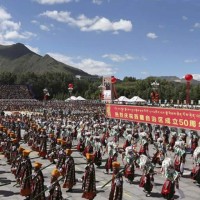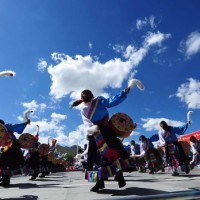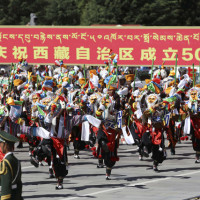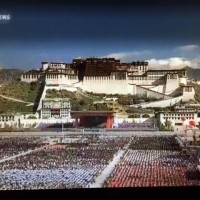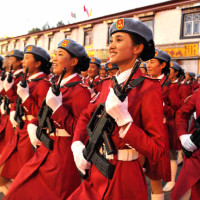- The Chinese leadership marked the anniversary of its establishment of the Tibet Autonomous Region (TAR) today in Lhasa with tough warnings of its resolve to crack down on the Dalai Lama’s influence and ‘anti-separatism’.
- A 65-member delegation from Beijing led by top Chinese political advisor Yu Zhengsheng presided over a ceremony today (September 8) in front of the Potala Palace, the Dalai Lama’s traditional winter residence, to mark the 50th anniversary of the Chinese Communist Party’s establishment of the Tibet Autonomous Region. The Chinese government marked the anniversary by issuing a lengthy ‘White Paper’ on Tibet’s ‘autonomy’, although Yu Zhengsheng made it clear in his comments at the rally that this is on the Party state’s terms, saying Tibetans had to “stick to the Communist Party’s leadership”.
- The Chinese authorities claimed that the theme of the anniversary was to follow the spirit of the ‘Sixth Work Forum’ in August, the first major policy meeting on Tibet to be presided over by Party leader Xi Jinping since he came to power in 2012. The meeting emphasized the importance of ‘stability’, political language for the elimination of dissent and enforcement of compliance to Chinese Communist Party policies, specifically blamed the Dalai Lama for ‘anti-separatist’ activities, and underlined the importance of the Tibet issue to the Beijing leadership.
Click to launch gallery »
- Tibetan dancers at the rally. The banner reads “Warmly celebrating the 50th anniversary of the creation of the Tibet Autonomous Region.”
- Scenes from a ceremony that was hosted in the square in front of the Potala Palace in Lhasa.
- Scenes from a ceremony that was hosted in the square in front of the Potala Palace in Lhasa.
- Chinese national flags on the ground after the anniversary rally.
- The rally today at the square outside the Potala Palace, with troops and participants in regimented rows.
- Scenes from a ceremony that was hosted in the square in front of the Potala Palace in Lhasa.
At the rally in Lhasa today, the official media cited Yu Zhengsheng as saying that: “Tibet has entered a new stage of sustained stability after people of all ethnic groups together fought against separatism, successfully foiling sabotage attempts by the 14th Dalai Lama group and international hostile forces.” (Xinhua, September 8, 2015).
The comments indicate there will be a continued focus on intensified security in an environment that is already deeply repressive, and hint at the tensions in Tibet. A mother of four who set fire to herself on August 27 was the most recent Tibetan to die in a wave of self-immolations across the plateau since 2009.[1]
Matteo Mecacci, President of the International Campaign for Tibet, said: “There is most emphatically nothing to celebrate on this political anniversary. The emphasis on tightening political control and virulent rhetoric to mark the occasion serves only to emphasize the hollow nature of the CCP’s position in Tibet. The White Paper about Tibet’s ‘autonomy’ only underlines its lack of legitimacy, given the extreme measures taken by the Party state to enforce its authority. Tibetans are further from any form of genuine autonomy than at any other period in the past half-century.”
The hardline emphasis demonstrated by the CCP in the Politburo meetings, large-scale anniversary rally and now the latest White Paper indicates that Tibet policy is a matter of prominent concern at the highest levels of the CCP, with the authorities regarding their struggle against the Dalai Lama as a protracted, long-term campaign. Tibet is now characterized as an issue of China’s ‘national security’, with Yu Zhengsheng stating at the rally today: “Tibet plays an important role in safeguarding national security, and it is in the interests of all Tibetan people to maintain national unity and ethnic solidarity.”
Party officials equate political ‘stability’ in the TAR with the security of the entire PRC, partly because Tibet is an important border area; areas of Tibet outside the TAR are less sensitive in terms of security considerations.[2] During the Sixth Work Forum in Beijing, Party Secretary and President Xi Jinping referred to its critical importance to the authorities of the TAR, saying that “in administering border regions”, “we must first of all stabilize Tibet”.[3]
Security had been dramatically tightened in Lhasa and the Tibet Autonomous Region in the buildup to today’s anniversary, with reports of increased numbers of police checkpoints and major troop movements, including tanks or heavy artillery in convoys of more than 200 vehicles, being observed in different areas.[4] On September 1, Tibet Autonomous Region officials led by Deng Xiaogang had held a conference in order to ensure there were no disruptions to the ceremonies today.[5]
The ceremony today was not announced in advance and was not the actual date of the anniversary of the establishment of the TAR in 1965. The Chinese authorities had declared the establishment of the Tibet Autonomous Region (formerly the Tibetan area of U-Tsang) on September 9, 1965. In 1984 its establishment day was changed to September 1, and this year was marked on September 8.[6]
A number of prominent present and former United Work Front Department officials accompanied Yu Zhengsheng to Lhasa for the events, including Sun Chunlan, Minister of the Central United Work Front Department. Among deputy heads of the delegation were Liu Yandong, who is on the top Politburo, and Du Qinglin, who as former heads of the United Work Front Department were involved in dialogue with the Dalai Lama’s envoys, which stalled in January 2010. One of the key priorities of the United Front Work Department appears to be maintaining a hardline position on Tibet, with a core mission of ‘struggle’ against the Dalai Lama, and its role has recently been upgraded with the announcement of the formation of a leading group for United Front work.[7]
Coinciding with the anniversary, the State Council in Beijing released a 14,000 word White Paper on the ‘Successful Practice of Regional Ethnic Autonomy in Tibet’.[8] This followed the publication of another long and elaborately argued White Paper on Tibet on April 15, outlining the CCP’s political position on the Dalai Lama and Tibet’s status in great detail with a much harsher approach than in previous such statements. In the paper, circulated widely in the Chinese state media, the authorities went on the attack over the Dalai Lama’s Middle Way approach, which advocates for a genuine autonomy under the sovereignty of the PRC. The Chinese authorities have issued more White Papers on Tibet than on Xinjiang, Hong Kong, Taiwan and Inner Mongolia put together.
The Tibet Work Forum in Beijing in August was the sixth such strategy meeting on Tibet to be held since the Chinese took over Tibet in 1949-50. Its clear emphasis was on ‘stability’, which is associated with a dramatic expansion of police and military powers. This appeared to be a strengthening of the Party state’s position since the last Work Forum in January, 2010, which focused on development, construction of infrastructure, and improvement in rural livelihoods.[9]
Yesterday (September 7), the day before the anniversary rally, Yu Zhengsheng visited the Jokhang temple, one of Tibet’s holiest sites, in an assertion of the CCP’s resolve to ensure its authority over Tibetan Buddhism and its religious institutions. Yu Zhengsheng, who is on the seven-member Politburo Standing Committee and heads the important Leading Group on Tibet, gave monks at the monastery a banner with the message from Xi Jinping of “Enhancing ethnic unity, building a beautiful Tibet.” in Chinese characters.[10]
The message from Xi to Jokhang monks is in the context of a deteriorating climate for Tibetan Buddhism. After overwhelmingly peaceful protests swept across Tibet in March and April 2008 – a result of the worsening situation in Tibet at that time — the Chinese authorities responded by intensifying an already established anti-Dalai Lama campaign, issuing further sweeping regulatory measures that intrude upon Tibetan Buddhist monastic affairs and implementing aggressive “legal education” programs that pressure monks and nuns to study and accept expanded government control over their religion, monasteries, and nunneries. Officials have detained, imprisoned, or beaten to death a number of monastic leaders, interfered with identification of reincarnations, and imposed a ban on travel, even for religious purposes to Mount Kailash.
Matteo Mecacci said: “The emphasis of the Chinese authorities today and during the Sixth Work Forum is alarming, indicating the Party state is seeking to broaden its reach still further, contracting the space for civil society and religious expression. This can only be counter-productive and damaging in the long-term.”
Footnotes
[1] ICT report, September 4, 2015
[2] Chairman of the Tibet Autonomous Region’s People’s Congress Pema Thinley (referred to as Padma Choling by Chinese media) underlined this approach on China’s National Day, October 1, when he said: “Tibet’s stability is tied to national stability, and Tibet’s security is tied to national security.” (Tibet Daily, October 3, 2014, http://epaper.chinatibetnews.com/xzrb/html/2014-10/03/content_572862.htm)
[3] Xinhua, August 25, 2015. This report, at http://news.xinhuanet.com/politics/2015-08/25/c_1116370428.htm (in Chinese) appears to be the most substantive account of Xi Jinping’s comments to the Forum.
[4] ICT report, August 12, 2015, https://www.https://savetibet.org/major-troop-movements-in-tibet-hardline-approach-to-dalai-lama-in-key-policy-talks
[5] Chinese state media report in Chinese, http://epaper.chinatibetnews.com/xzrb/html/2015-09/02/content_642797.htm
[6] According to the Chinese state media: “The first meeting of the People’s Congress of the Tibet Autonomous Region met in Lhasa on September 1, 1965, and at the closing meeting on September 9 they declared the establishment of the Tibet Autonomous Region. From 1965 to 1983, Tibet celebrated its establishment day on September 9, including in 1975 when a delegation from the central government joined in the 10th anniversary celebrations. In 1984, Tibet proposed to change its establishment day from September 9 to September 1, and the central government agreed. A delegation from the central government has joined celebrations of each decade anniversary in 1985, 1995, and 2005 on September 1.” (http://eng.tibet.cn/2010gd/xw/201506/t20150623_3298498.html).
[7] ICT report, August 12, 2015, https://www.https://savetibet.org/major-troop-movements-in-tibet-hardline-approach-to-dalai-lama-in-key-policy-talks/
[8] http://news.xinhuanet.com/english/china/2015-09/06/c_134594114.htm
[9] The main ‘direction of attack’ in the Fifth Work Forum in Jan 2010 was listed as the following: “Improvement in the people’s livelihood”; “Development of social undertakings”; “Protection for the ecological environment”; “Construction of the infrastructure.”
[10] In Chinese, http://epaper.chinatibetnews.com/xzrb/html/2015-09/08/content_644053.htm


